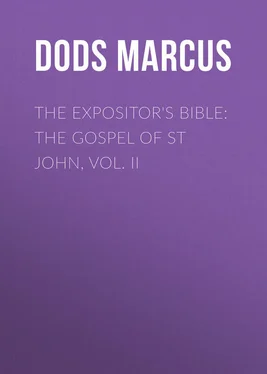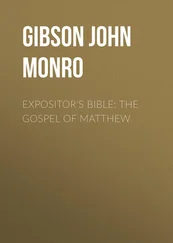Marcus Dods - The Expositor's Bible - The Gospel of St John, Vol. II
Здесь есть возможность читать онлайн «Marcus Dods - The Expositor's Bible - The Gospel of St John, Vol. II» — ознакомительный отрывок электронной книги совершенно бесплатно, а после прочтения отрывка купить полную версию. В некоторых случаях можно слушать аудио, скачать через торрент в формате fb2 и присутствует краткое содержание. Издательство: Иностранный паблик, Жанр: foreign_religion, foreign_antique, foreign_prose, на английском языке. Описание произведения, (предисловие) а так же отзывы посетителей доступны на портале библиотеки ЛибКат.
- Название:The Expositor's Bible: The Gospel of St John, Vol. II
- Автор:
- Издательство:Иностранный паблик
- Жанр:
- Год:неизвестен
- ISBN:нет данных
- Рейтинг книги:5 / 5. Голосов: 1
-
Избранное:Добавить в избранное
- Отзывы:
-
Ваша оценка:
- 100
- 1
- 2
- 3
- 4
- 5
The Expositor's Bible: The Gospel of St John, Vol. II: краткое содержание, описание и аннотация
Предлагаем к чтению аннотацию, описание, краткое содержание или предисловие (зависит от того, что написал сам автор книги «The Expositor's Bible: The Gospel of St John, Vol. II»). Если вы не нашли необходимую информацию о книге — напишите в комментариях, мы постараемся отыскать её.
The Expositor's Bible: The Gospel of St John, Vol. II — читать онлайн ознакомительный отрывок
Ниже представлен текст книги, разбитый по страницам. Система сохранения места последней прочитанной страницы, позволяет с удобством читать онлайн бесплатно книгу «The Expositor's Bible: The Gospel of St John, Vol. II», без необходимости каждый раз заново искать на чём Вы остановились. Поставьте закладку, и сможете в любой момент перейти на страницу, на которой закончили чтение.
Интервал:
Закладка:
The encomium, therefore, was deserved and appropriate. In her love the Lord would ever live: so long as she existed the remembrance of Him could not die. No death could touch her heart with his chilly hand and freeze the warmth of her devotion. Christ was immortal in her, and she was therefore immortal in Him. Her love was a bond that could not be broken, the truest spiritual union. In embalming Him, therefore, she unconsciously embalmed herself. Her love was the amber in which He was to be preserved, and she became inviolable as He. Her love was the marble on which His name and worth were engraven, on which His image was deeply sculptured, and they were to live and last together. Christ “prolongs His days” in the love of His people. In every generation there arise those who will not let His remembrance die out, and who to their own necessities call out the living energy of Christ. In so doing they unwittingly make themselves undying as He; their love of Him is the little spark of immortality in their soul. It is that which indissolubly and by the only genuine spiritual affinity links them to what is eternal. To all who thus love Him Christ cannot but say, “Because I live, ye shall live also.”
Another point in our Lord’s defence of Mary’s conduct, though it is not explicitly asserted, plainly is, that tributes of affection paid directly to Himself are of value to Him. Judas might with some plausibility have quoted against our Lord His own teaching that an act of kindness done to the poor was kindness to Him. It might be said that, on our Lord’s own showing, what He desires is, not homage paid to Himself personally, but loving and merciful conduct. And certainly any homage paid to Himself which is not accompanied by such conduct is of no value at all. But as love to Him is the spring and regulator of all right conduct, it is necessary that we should cultivate this love; and because He delights in our well-being and in ourselves, and does not look upon us merely as so much material in which He may exhibit His healing powers, He necessarily rejoices in every expression of true devotedness that is paid to Him by any of us.
And on our side wherever there is true and ardent love it must crave direct expression. “If ye love me,” says our Lord, “keep my commandments”; and obedience certainly is the normal test and exhibition of love. But there is that in our nature which refuses to be satisfied with obedience, which craves fellowship with what we love, which carries us out of ourselves and compels us to express our feeling directly. And that soul is not fully developed whose pent-up gratitude, cherished admiration, and warm affection do not from time to time break away from all ordinary modes of expressing devotion and choose some such direct method as Mary chose, or some such straightforward utterance as Peter’s: “Lord, Thou knowest all things, Thou knowest that I love Thee.”
It may, indeed, occur to us, as we read of Mary’s tribute to her Lord, that the very words in which He justified her action forbid our supposing that any so grateful tribute can be paid Him by us. “Me ye have not always” may seem to warn us against expecting that so direct and satisfying an intercourse can be maintained now, when we no longer have Him. And no doubt this is one of the standing difficulties of Christian experience. We can love those who live with us, whose eye we can meet, whose voice we know, whose expression of face we can read. We feel it easy to fix our affections on one and another of those who are alive contemporaneously with ourselves. But with Christ it is different: we miss those sensible impressions made upon us by the living bodily presence; we find it difficult to retain in the mind a settled idea of the feeling He has towards us. It is an effort to accomplish by faith what sight without any effort effectually accomplishes. We do not see that He loves us; the looks and tones that chiefly reveal human love are absent; we are not from hour to hour confronted, whether we will or no, with one evidence or other of love. Were the life of a Christian nowadays no more difficult than it was to Mary, were it brightened with Christ’s presence as a household friend, were the whole sum and substance of it merely a giving way to the love He kindled by palpable favours and measurable friendship, then surely the Christian life would be a very simple, very easy, very happy course.
But the connection between ourselves and Christ is not of the body that passes, but of the spirit which endures. It is spiritual, and such a connection may be seriously perverted by the interference of sense and of bodily sensations. To measure the love of Christ by His expression of face and by His tone of voice is legitimate, but it is not the truest measurement: to be drawn to Him by the accidental kindnesses our present difficulties must provoke is to be drawn by something short of perfect spiritual affinity. And, on the whole, it is well that our spirit should be allowed to choose its eternal friendship and alliance by what is specially and exclusively its own, so that its choice cannot be mistaken, as the choice sometimes is when there is a mixture of physical and spiritual attractiveness. So much are we guided in youth and in the whole of our life by what is material, so freely do we allow our tastes to be determined and our character to be formed by our connection with what is material, that the whole man gets blunted in his spiritual perceptions and incapable of appreciating what is not seen. And the great part of our education in this life is to lift the spirit to its true place and to its appropriate company, to teach it to measure its gains apart from material prosperity, and to train it to love with ardour what cannot be seen.
Besides, it cannot be doubted that this incident itself very plainly teaches that Christ came into this world to win our love and to turn all duty into a personal acting towards Him; to make the whole of life like those parts of it which are now its bright exceptional holiday times; to make all of it a pleasure by making all of it and not merely parts of it the utterance of love. Even a little love in our life is the sunshine that quickens and warms and brightens the whole. There seems at length to be a reason and a satisfaction in life when love animates us. It is easy to act well to those whom we really love, and Christ has come for the express purpose of bringing our whole life within this charmed circle. He has come not to bring constraint and gloom into our lives, but to let us out into the full liberty and joy of the life that God Himself lives and judges to be the only life worthy of His bestowal upon us.
II. THE ENTRY INTO JERUSALEM
“On the morrow a great multitude that had come to the feast, when they heard that Jesus was coming to Jerusalem, took the branches of the palm trees, and went forth to meet Him, and cried out, Hosanna: Blessed is He that cometh in the name of the Lord, even the King of Israel. And Jesus, having found a young ass, sat thereon; as it is written, Fear not, daughter of Zion: behold, thy King cometh, sitting on an ass’s colt. These things understood not His disciples at the first: but when Jesus was glorified, then remembered they that these things were written of Him, and that they had done these things unto Him. The multitude therefore that was with Him when He called Lazarus out of the tomb, and raised him from the dead, bare witness. For this cause also the multitude went and met Him, for that they heard that He had done this sign. The Pharisees therefore said among themselves, Behold, how ye prevail nothing: lo, the world is gone after Him.” – John xii. 12–19.
If our Lord arrived in Bethany on Friday evening and spent the Sabbath with His friends there, “the next day” of ver. 12 is Sunday; and in the Church year this day is known as Palm Sunday, from the incident here related. It was also the day, four days before the Passover, on which the Jews were enjoined by the law to choose their paschal lamb. Some consciousness of this may have guided our Lord’s action. Certainly He means finally to offer Himself to the people as the Messiah. Often as He had evaded them before, and often as He had forbidden His disciples to proclaim Him, He is now conscious that His hour has come, and by entering Jerusalem as King of peace He definitely proclaims Himself the promised Messiah. As plainly as the crowning of a new monarch and the flourish of trumpets and the kissing of his hand by the great officers of state proclaim him king, so unmistakably does our Lord by riding into Jerusalem on an ass and by accepting the hosannas of the people proclaim Himself the King promised to men through the Jews, as the King of peace who was to win men to His rule by love and sway them by a Divine Spirit.
Читать дальшеИнтервал:
Закладка:
Похожие книги на «The Expositor's Bible: The Gospel of St John, Vol. II»
Представляем Вашему вниманию похожие книги на «The Expositor's Bible: The Gospel of St John, Vol. II» списком для выбора. Мы отобрали схожую по названию и смыслу литературу в надежде предоставить читателям больше вариантов отыскать новые, интересные, ещё непрочитанные произведения.
Обсуждение, отзывы о книге «The Expositor's Bible: The Gospel of St John, Vol. II» и просто собственные мнения читателей. Оставьте ваши комментарии, напишите, что Вы думаете о произведении, его смысле или главных героях. Укажите что конкретно понравилось, а что нет, и почему Вы так считаете.












